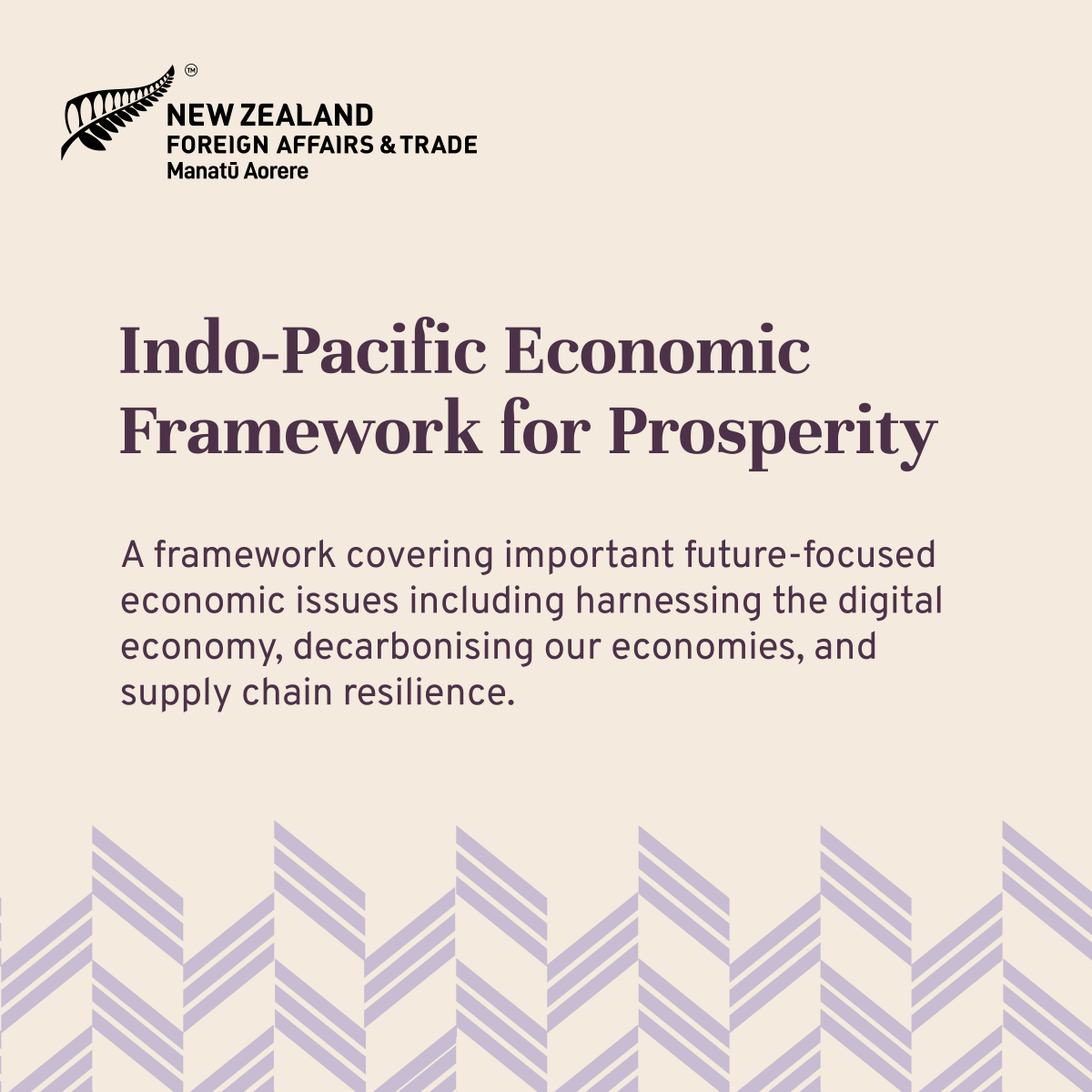
Indo-Pacific Economic Framework for Prosperity (IPEF) overview
The Indo-Pacific Economic Framework for Prosperity (IPEF) is an economic framework made up of three main pillars (a separate trade pillar is still under negotiation):
- supply chains;
- clean economy; and
- fair economy.

Update: July 26 2024
Minister for Trade Todd McClay signed the Fair Economy Agreement and the Agreement on IPEF and Minister of Climate Change Simon Watts signed the Clean Economy Agreement, during an IPEF ministerial meeting in Singapore on 6 June. This follows New Zealand signature of the Supply Chain Agreement in November 2023.
Ministers also led an investment mission supported by NZTE which included a group of top New Zealand climate tech companies and sustainable investors. The New Zealand tech companies and investors took part in the first annual IPEF Clean Economy Investor Forum held alongside the ministerial meeting. The Forum was organised to bring together emerging climate tech companies and investors to catalyse innovation in and development of sustainable infrastructure and climate technology projects. New Zealand was strongly represented with eight New Zealand companies named in HolonIQ’s Indo-Pacific Climate Tech 100, featuring the region’s most promising start-ups.
The Parliamentary Treaty Examination Process is under way. The signed agreements and National Interest Analysis [PDF, 1.4 MB] were referred to Parliament in early June and the Foreign Affairs, Defence and Trade Committee held an initial hearing on 27 June. A public hearing was held on 25 July. Once the review has concluded, New Zealand will ratify the four agreements. The agreements will enter into force 30 days after ratification.
National Interest Analysis [PDF, 1.4 MB]
Press Release on the IPEF Clean Economy Investor Forum(external link)
Origins of IPEF
On 23 May 2022, Leaders from 14 Indo-Pacific countries, including New Zealand, announced the start of talks toward launching negotiations on the Indo-Pacific Economic Framework for Prosperity (IPEF). The Joint Leaders statement on the proposed initiative can be read here: Statement on Indo-Pacific Economic Framework for Prosperity | The White House(external link).
On 16 November 2023, IPEF partners met in San Francisco to announce the substantial conclusion of negotiations of the Clean Economy Agreement, the Fair Economy Agreement, and an overarching Agreement on the Indo-Pacific Economic Framework for Prosperity, which establishes a ministerial-level council and commission to allow ongoing high level engagement on progress, future direction and membership of IPEF.
In addition, IPEF partners took stock of the significant progress made on negotiations on the trade pillar.
In San Francisco in the same week (on 14 November 2023), Ministers signed the Supply Chain Agreement for which negotiations concluded in May 2023
Texts for the IPEF agreements can be accessed through the IPEF statements and resources page.
The various statements can be read here:
- US Department of Commerce Press Release marking the March Virtual Ministerial Meeting(external link) – 14 March 2024.
Background
IPEF membership extends right across the Indo-Pacific region, from India to the United States. The participating countries are Australia, Brunei Darussalam, Fiji, India, Indonesia, Japan, the Republic of Korea, Malaysia, New Zealand, the Philippines, Singapore, Thailand, the United States and Viet Nam. Together the 14 economies represented 40% of global GDP in 2021.
In September 2022, the scoping phase concluded, and New Zealand joined the launch of negotiations on the four pillars of IPEF negotiations (trade; supply chains; clean economy; and fair economy). Negotiation rounds took place in December of 2022, and February, March, May, July, October and November of 2023.
Key New Zealand interests are concentrated in the Indo-Pacific region. IPEF members take half of New Zealand's exports, and it is home to over half of the world’s population. New Zealand has an interest in helping shape an Indo-Pacific order that delivers regional stability and economic integration in a sustainable and inclusive way.
The IPEF framework addresses a range of key issues facing our region including harnessing the digital economy, decarbonising our economies, and making our supply chains more resilient.
The principles of sustainability and inclusivity are embedded throughout the framework. There are strong linkages with the principles that underpin New Zealand’s inclusive approach to trade.
IPEF, including the ongoing negotiations under the trade pillar, is not a free trade agreement and does not include market access for goods or services through traditional schedules, though there is commercial opportunity for New Zealand in the trade pillar through the negotiation of rules on Trade Facilitation, Digital Trade, and Regulatory Cooperation among other things.

